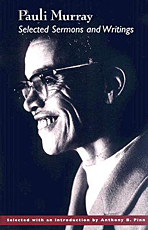"I have never been able to accept what I believe to be an injustice. Perhaps it is because of this I am America's problem child, and will continue to be," Pauli Murray (1910 - 1985) once observed about herself. This attorney, writer, and activist was a pioneer in many arenas and a firm advocate for justice in America for blacks and women.
Born in Baltimore and raised in North Carolina, Murray graduated from Hunter College in New York. During the 1930s, she found a job with the Works Projects Administration (WPA) and also became involved in the civil rights movement. A member of the Fellowship for Reconciliation, she went to prison in 1940 for refusing to sit in the back of a bus in Virginia.
Murray enrolled in Howard University Law School and completed her studies in 1944, the only woman in her graduating class. Her devotion to democracy and human rights got a workout from 1946 to 1977 when she was the first African-American deputy attorney general of California, a professor of law at Brandeis University, and a co-founder of the National Organization of Women. In 1977, Murray became the first African-American woman to become an Episcopal priest. She died of cancer in 1985.
This fascinating collection of sermons and writings selected by Anthony B. Pinn demonstrates her commitment to women's issues and justice as part of her Christian beliefs. Compassion was a primary dimension of her faith:
"In his deep humanity, Jesus was transparent to God's love and compassion for us. I believe that compassion is a gift of God's grace, our response to God's love. It is the capacity for placing ourselves in another's predicament, feeling 'from the inside' what it means to be another person, 'feeling with,' 'suffering with,' so that another's pain becomes our pain, another's struggle our struggle. Without compassion, all our works are meaningless. With it, we become more like Christ."
Murray also was ahead of her time in preaching about the Motherhood of God and the heroism of women in the Bible. She was a great admirer of Eleanor Roosevelt — especially her generosity of being and her sense of mission that permitted her to waste no time that could be used productively. As a preacher, Murray emphasized the challenge that all Christians face when they try to determine the guise of Jesus in their everyday life:
"Who is Jesus the Christ to you? Is he the young couple and their child who came into our midst last week and through whom a minor miracle was performed? Is he the lady next door who speaks only Greek and with whom we communicate almost wholly through body language? Is he a sister-or-brother church member who exasperates you one day and embraces you the next? Is he the surgeon who saves your life and then asks for you to pray for him in an upcoming difficult operation? Is he the person who is hostile to you, gossips about you, passes on unfounded rumors, yet cries out for love and understanding? Who is Jesus Christ to you?"
The last section of this paperback contains lectures and essays by Murray including ones on the future of the Episcopal Church of the USA, the challenge of nurturing the Christian community in its diversity, and an overview of minority women and feminist spirituality.
